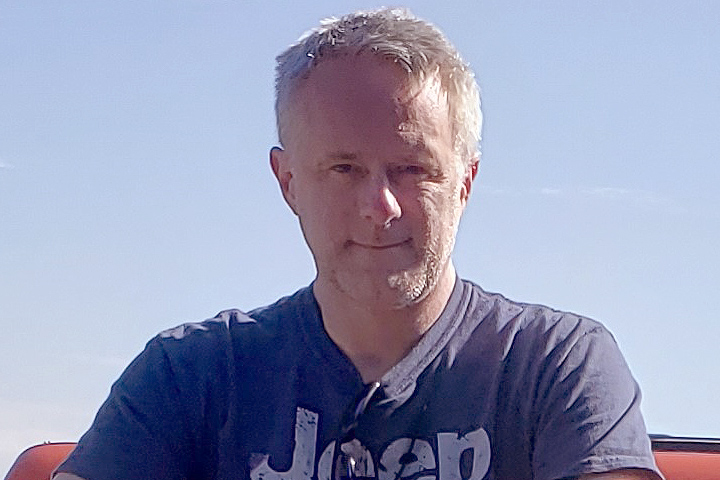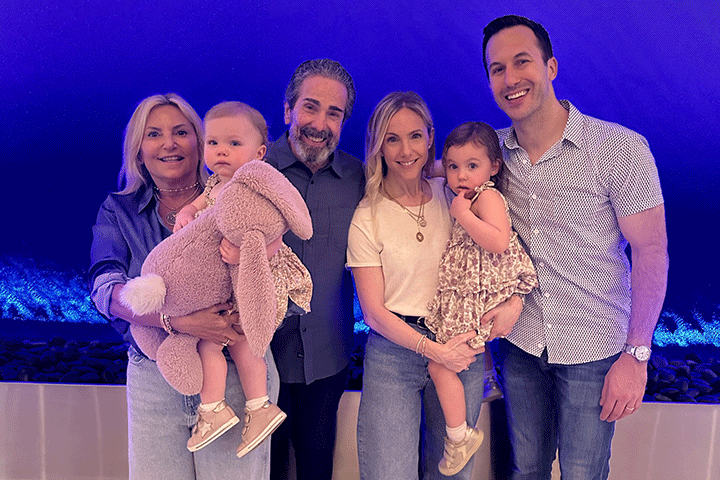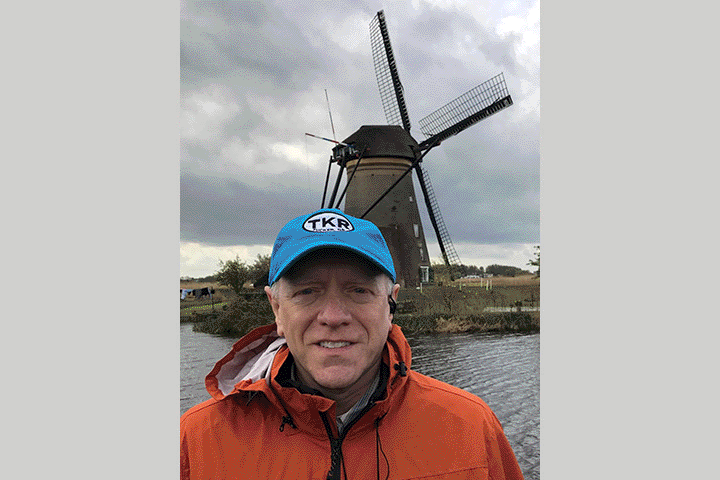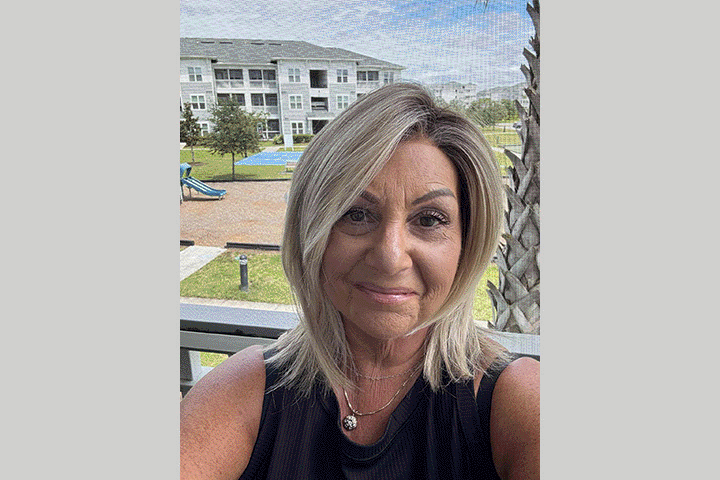How Could This Happen to Me?

- Very rare acinar cell carcinoma in the pancreas
- Distal pancreatectomy
- Chemotherapy with FOLFIRINOX
- Counseling helps with fear and loneliness
It all started in late July 2021 with an agonizing night of stomach pain that would not go away. It was a sharp, stabbing, abdominal pain.
I went to the emergency room but sat in agony as I waited for an exam, treatment, and much-needed painkillers. After countless X-rays, CT scans, and MRIs, I received the diagnosis of pancreatic cancer. More specifically, it was acinar cell carcinoma in the pancreas.
My emotions began to overflow—resentment, immense fear, and loneliness. I resented my own body for letting me down, and I kept wondering—how could this happen to me? Although my habits weren’t top-notch, I generally took care of myself. In the back of my mind, I knew I could do better. Still, I was 51 years old and was bordering on absolute denial that this could happen to me.
Coping with Surgery, Treatment, and their Side Effects
My first consultations with my oncologist Dr. Nibal Saad, then at Beacon Cancer Care Memorial and surgeon Dr. Urs von Holzen at the Goshen Center for Cancer Care led to tidal waves of fear. This type of cancer required surgery to remove the tail of the pancreas and the spleen (distal pancreatectomy, splenectomy, and lesser omentum), neither of which I was inclined to give up.
Besides the surgery, I would have to undergo twelve sessions of the strong FOLFIRINOX chemotherapy regimen and have a port installed in my chest for the intravenous infusion. I did not want something semi-permanent installed inside of me. It seemed too much like a plug for an electric car. The nurse navigator explained the drugs I would be taking in the chemotherapy regimen and the supplemental drugs. My fear was compounding.
But it didn’t end there. There was also a long list of side effects that the chemo and related drugs could cause. Everything threw me into stretches of tearful nights and bouts of depression. This just couldn’t be happening. I kept wishing with all my might that it would magically go away, that someone had made a terrible mistake, and that I was actually okay.
After my diagnosis, I researched alternatives for the chemo and the port. I simply refused to believe that this was the only course available. I found a long list of potential treatment options, including stem cell therapy, monoclonal antibodies, clinical trials, and even nanotechnology. Sadly, none of the options was appropriate (or approved) for pancreatic cancer. My oncologist commended me for trying. He reassured me that although this chemo regimen was very strong, it provided excellent results.
Friends, Family, and Counseling
The infusion sessions were done every other week. They began on Thursdays at 7:30 AM when I would have blood tests, vitals, and then a consultation with the doctor or the nurse practitioner. At 8:30 AM I would be “plugged in” to start the premedications after which the chemotherapy infusion would begin. Around 3:00 PM they would install the “feeder ball” that delivered the last chemo drug to my body over the course of 46 hours. On Saturday afternoon I would return to the infusion center to get the ball unplugged and get Neulasta, a medicine given to increase my white blood cells and prevent infection. At first I was terrified of the entire process, but after a few sessions I calmed down, spending the time doing work, reading, or watching TV in my private room.
The surgery was successful. I was lucky that the cancer was diagnosed in time, which is often not the case with this vicious pancreatic cancer. The tumor was small and had not spread to any other part of my body. After the surgery, I spent two days in the ICU, and then I was moved to a regular room.
I had to share the new room with an older fellow, but thus began my epiphany. One fateful night a doctor came to tell him that his cancer was terminal, and then he explained the options going forward. I just listened and cried a little for him and for me, thinking that this could easily have been me! That ten-minute conversation had an enduring effect on my perspective.
A Cancer-Free Life
The chemo sessions went smoothly and I developed a routine. I was thankful that my side effects were mainly annoying and/or cosmetic and I realized things could always be worse. I had hair loss at the height of chemo. It all grew back, thankfully, though now it is dark gray! I also had neuropathy in my hands and fingers, but it has eased since I completed my chemo.
My final chemo session was completed in March 2022 and the follow-up CT scan was in mid-April. The staff at the infusion center knew me well by then, and they were beyond wonderful. All of them—nurses, navigators, medical assistants, the nurse practitioner, and the oncologist—were incredibly helpful, kind, and supportive in my struggle. The surgeon and his staff at Goshen Center for Cancer Care were equally supportive.
My employer was wonderful as well, allowing me to work remotely during my treatment sessions. I was lucky not to have to take time off from work.
But the whole process was beyond any nightmare I had ever imagined. The incredible solitude I endured was equally scary, were it not for the unyielding love and companionship of my two Chihuahuas Lena and Connor. Otherwise, I live alone with most of my friends and family an hour or more away. Part of me wanted to shut everyone out. Thankfully, I have an amazing group of friends, family, and extended family who came to my aid. Some weeks during my treatment I went to sleep in sheer terror and I felt so alone, scared, and even doomed. But I let just a few into my circle, which brought me so much joy. I began seeing a wonderful counselor to help me with my emotional state and sleepless nights. I could not have navigated this bumpy journey without my outstanding support group for which I am forever grateful!
Now I am looking forward to getting on with life, putting this behind me, and not letting this diagnosis define who I am. I hope I have the opportunity to give back to the spectacular pancreatic cancer community as a whole for helping me get to this point.
A New Perspective
I look back and count how lucky I am to have survived. Now, I must look forward and not let my diagnosis define me. I am Michael, the happy-go-lucky guy who HAPPENS to be a cancer survivor. Sure, I face some heavy medical bills, and yes there are lingering effects like minor neuropathy in my fingers. I have to be mindful of diet and exercise, and not slip into old habits that could have serious consequences down the line. I survived an extremely mild case of COVID, but as one who is immunocompromised, my health and well-being are foremost on my mind. I am determined to remain cancer free!
Advice for Others
My advice to anyone in a similar situation is to reach deep into your soul to find your strength—you can do it! And for you, your friends, and your loved ones to get a cancer screening as soon as you can. All cancers are hideous, but pancreatic cancer can be one of the most silent and deadly types unless it is detected early.
I have read and listened to many stories similar to (and different from) my own, and I came across these very inspiring words from Bob Marley that guided me from the very beginning: “You never know how strong you are, until being strong is your only choice.”
To everyone out there, peace and luck be with you!






